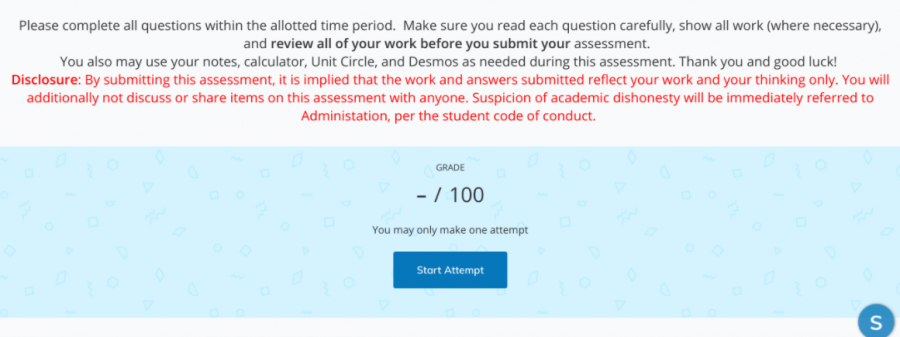Online tests and quizzes replace traditional values of in-class exams
In many classes, tests and quizzes account for a large percentage of a student’s grade. Even before online learning started, teachers had different ways of giving tests: some allowed students to have a notecard, some had partner tests.
With online learning, however, this was something that all teachers were forced to reconsider.
Many teachers are using the Schoology assessment tool to give tests, while others are using AP Classroom and even Kahoot or Quizizz.
“I have been using the Schoology assessment tool,” said U.S. History and AP Gov teacher Rebecca Ball. “It’s very different, because I know I have no control over the students during the test, so they have to be open note.”
This is a universal issue and concern. A study by ProctorU, an online exam proctoring platform, found that before wide-spread online schooling, students were caught cheating on less than 1% of the 340,000 exams they administered from January to March. When online schooling and testing rose dramatically in the spring of 2020, the cheating rate increased to over 8%.
Some applications, such as AP Classroom, have implemented a lockdown browser so that students cannot open another tab on that device while they are testing. But this isn’t foolproof; there are still paper notes, fellow classmates, and unlimited access to the internet through other devices.
“For AP classes, that’s a bit worrisome, because I’m trying to prepare them for the AP exam and I’m afraid they won’t be ready if they haven’t challenged themselves to take the tests without notes,” said Ball.
A statement on the CollegeBoard website says that “the 2021 AP Exams will cover the full course content so that students are accurately placed into higher-level courses where they can succeed when they get to college. If health and safety conditions allow, your school can offer in-person testing—and if not, that’s OK. We’ll offer options so all students can test, even if school buildings are closed.”
More information will be released in early 2021, but this means that students will need to have learned the full curriculum if they plan to take the tests.
“I feel that almost always, the teachers prepare us very well for the online tests and quizzes,” said sophomore Emily Cooper. “Especially in math, we do lots of practice questions and quizzes where we go over the answers as a class. I think that this is a very helpful way of studying.”
But not all students feel like this is the case for every class.
“For AP classes, I have to study quite a bit,” said sophomore Maya Mustata. “I have a test coming up where, due to us being given material and told to learn it without it actually being taught, I feel unprepared and I think I will have to self-study and learn it.”
Along with learning all the material comes the actual number of tests that teachers are giving.
“I feel like I am getting a reasonable amount of tests and quizzes,” said Cooper. “My teachers have done a very good job with balancing the amount of quizzes and tests with projects and assignments.”
Mustata agreed. “I think I am receiving a normal amount of tests and quizzes, but I’m noticing that most teachers are only giving unit tests and taking out the small quizzes in between them in order to save time for actually learning the material.”
In terms of finals, teachers are again using different approaches. Some classes, such as calculus, AP statistics, and cooking, have already said they will not be having a regular final. What such classes will be doing in place of finals varies from potentially nothing to a big project and various ideas in between.
“I believe the district will be giving us certain parameters,” said Ball. “We will be finding out soon from what I understand.”


